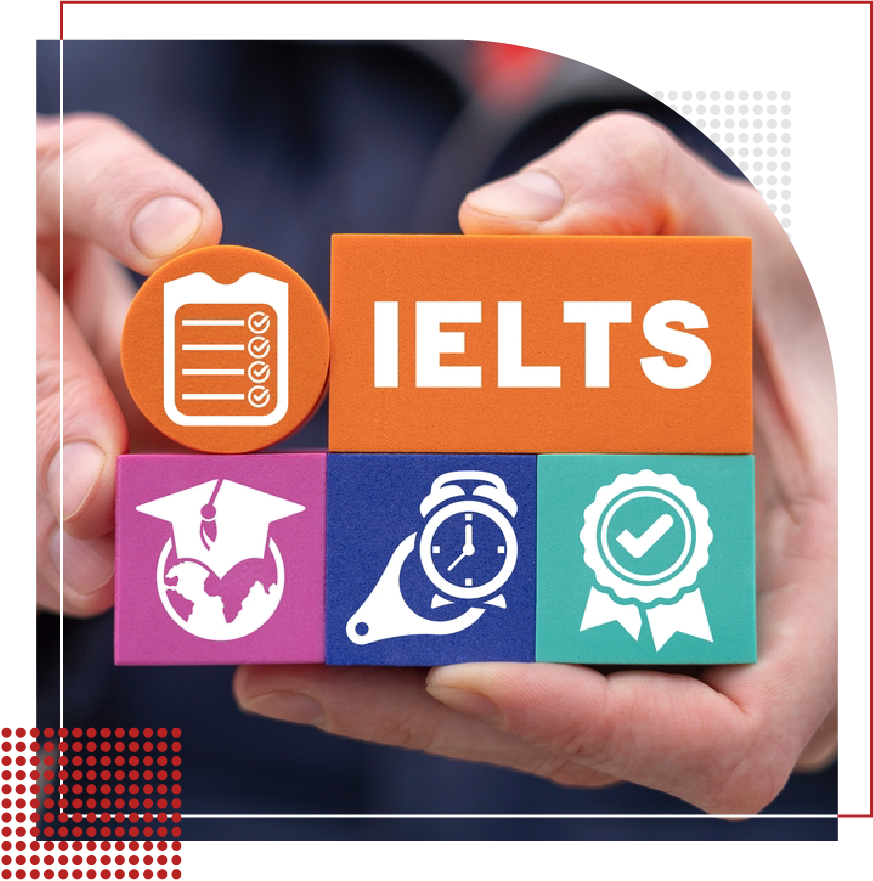Spoken English, IELTS, TOEFL, PTE, Study Abroad, Visa Consultation.
International English Language Testing System
IELTS Overview
The International English Language Testing System (IELTS) is a globally recognized test that measures English language proficiency across four key skills: listening, reading, writing, and speaking. It is designed for non-native English speakers who aspire to study, work, or live in an English-speaking environment. With two types of tests—Academic and General Training—IELTS caters to a wide range of candidates, ensuring that the assessment aligns with their goals, whether for academic purposes or vocational training. At Karm Institute, we provide comprehensive IELTS preparation courses tailored to help students achieve their desired scores. Our experienced instructors focus on familiarizing candidates with the test format and strategies to enhance performance in each section. Through interactive practice sessions, personalized feedback, and mock tests, we equip students with the skills and confidence needed to excel in the IELTS exam. By choosing Karm Institute, you take a significant step toward your global ambitions.

- IELTS Academic
- IELTS General Training
- IELTS Modules Format
IELTS Academic is suitable for candidates
- Study in English-speaking Universities for degree level education and above.
- For Professional Registration.
This test measures English proficiency on a Reading, Writing, Speaking, and Listening basis. It can be attempted on Paper, Computer, or Online (at home).
IELTS General Training is appropriate for candidates who wish
- To apply for below-degree-level courses in English-speaking countries.
- To get work experience or employment purposes.
- To migrate to certain countries (UK, Australia, Canada, and New Zealand).
| Modules | Types of Questions | Duration |
|---|---|---|
| SPEAKING | • Introduction and Interview, | 11-15 mins |
| • Long Turn, | ||
| • Discussion | ||
| LISTENING | 40 questions-The questions in the Listening section come in various formats, such as Multiple Choice, Matching, Map/Diagram Labeling, and Form Completion | 30 Mins |
| READING | 40 Questions–The Reading section includes a range of question types, such as Multiple Choice, Matching, Sentence Completion, True/False/Not Given, and Summary Completion. | 60 Mins |
| WRITING | • Descriptive Report (Academic) or Letter (General Training) | 60 Mins |
| • Essay (Both Academic and General Training) |
Why Prefer Taking the IELTS Exam?
1
Global Recognition
IELTS is widely accepted by universities, employers, and immigration authorities in English-speaking countries around the world.
2
Flexible Test Dates
IELTS offers numerous test dates throughout the year, allowing candidates to choose a time that fits their schedule.
3
Choice of Test Format
Candidates can opt for either the paper-based or computer-based version of the test, depending on their comfort level.
4
Real-Life Context
The exam content reflects real-world scenarios, making it relevant for academic and professional use.
5
Structured Preparation
A variety of preparation resources, including courses and practice materials, are available to help candidates succeed.
6
Personal Speaking Assessment
The speaking section is conducted in person with an examiner, providing a more accurate measure of conversational skills.
7
No Pass or Fail
IELTS provides a band score that reflects the candidate's proficiency level, allowing for better understanding rather than a simple pass/fail outcome.
8
Opportunities for Migration
Many countries require IELTS scores for visa applications, making it a critical step for those looking to live abroad.
9
Comprehensive Assessment
The test evaluates all four essential language skills: listening, reading, writing, and speaking, providing a holistic view of a candidate’s proficiency.
10
Improved Language Skills
Preparing for the IELTS can enhance overall English language proficiency, benefiting candidates in their academic and professional pursuits.
Since 2003, Karm Institute has been dedicated to providing top-quality education and guidance in Spoken English, IELTS, TOEFL, and a range of overseas education services.
Coaching
Contact Info
Call Us
+91 75672 08826
Write Email
info@karminstitute.com
Our Location
No. 122, Shayona Arcade, Bapunagar, Ahmedabad, Gujarat.
Copyright © 2025 by Karm Institute
Best website development company in Ahmedabad Capital Web